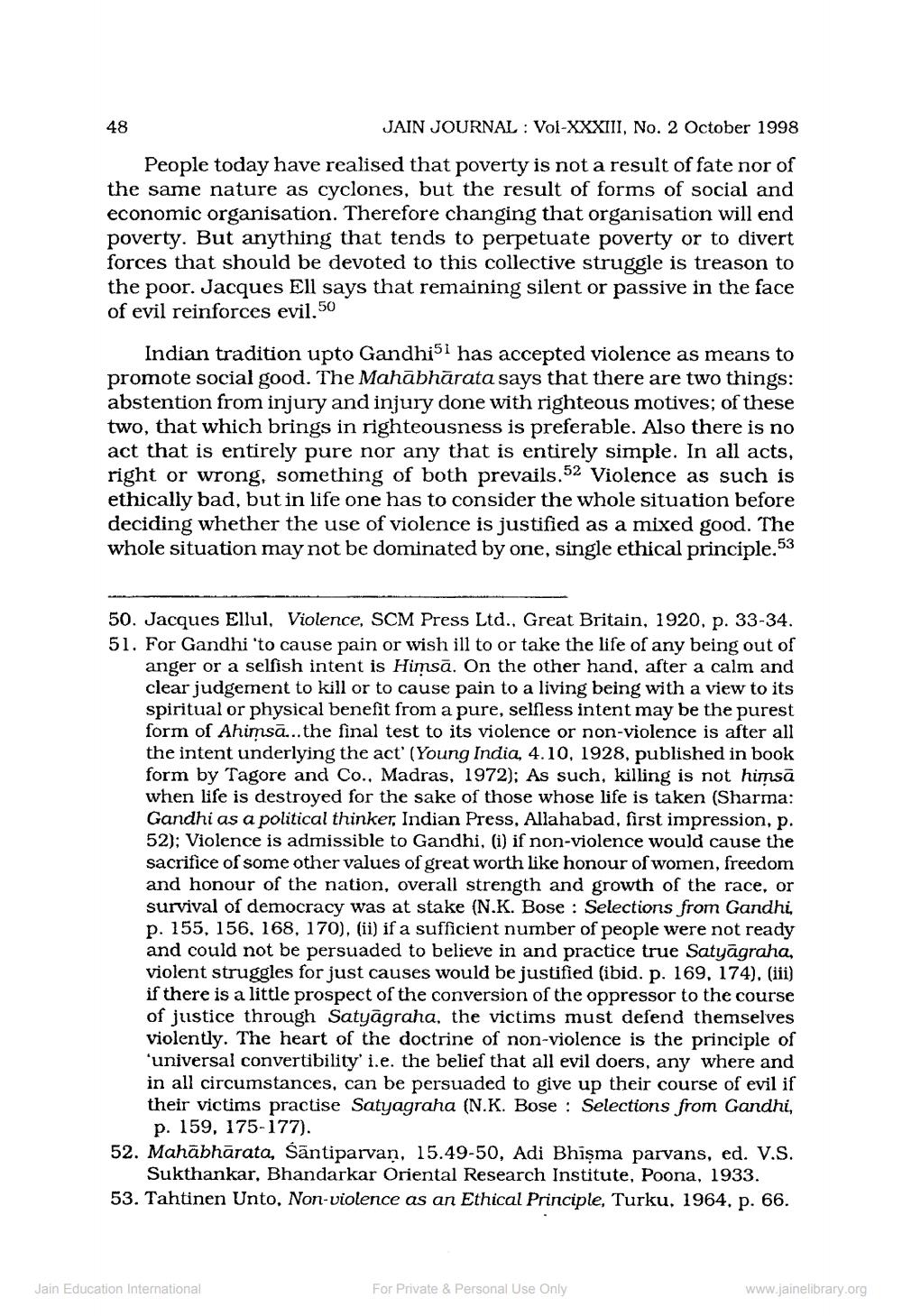________________
48
JAIN JOURNAL : Vol-XXXIII, No. 2 October 1998
People today have realised that poverty is not a result of fate nor of the same nature as cyclones, but the result of forms of social and economic organisation. Therefore changing that organisation will end poverty. But anything that tends to perpetuate poverty or to divert forces that should be devoted to this collective struggle is treason to the poor. Jacques Ell says that remaining silent or passive in the face of evil reinforces evil.50
Indian tradition upto GandhiSi has accepted violence as means to promote social good. The Mahabharata says that there are two things: abstention from injury and injury done with righteous motives; of these two, that which brings in righteousness is preferable. Also there is no act that is entirely pure nor any that is entirely simple. In all acts, right or wrong, something of both prevails.52 Violence as such is ethically bad, but in life one has to consider the whole situation before deciding whether the use of violence is justified as a mixed good. The whole situation may not be dominated by one, single ethical principle.53
50. Jacques Ellul, Violence, SCM Press Ltd., Great Britain, 1920, p. 33-34. 51. For Gandhi 'to cause pain or wish ill to or take the life of any being out of
anger or a selfish intent is Himsā. On the other hand, after a calm and clear judgement to kill or to cause pain to a living being with a view to its spiritual or physical benefit from a pure, selfless intent may be the purest form of Ahimsā... the final test to its violence or non-violence is after all the intent underlying the act' (Young India, 4.10, 1928, published in book form by Tagore and Co., Madras, 1972); As such, killing is not himsā when life is destroyed for the sake of those whose life is taken (Sharma: Gandhi as a political thinker, Indian Press, Allahabad, first impression, p. 52); Violence is admissible to Gandhi, (i) if non-violence would cause the sacrifice of some other values of great worth like honour of women, freedom and honour of the nation, overall strength and growth of the race, or survival of democracy was at stake (N.K. Bose : Selections from Gandhi, p. 155, 156, 168, 170), (ii) if a sufficient number of people were not ready and could not be persuaded to believe in and practice true Satyagraha, violent struggles for just causes would be justified (ibid. p. 169, 174), (iii) if there is a little prospect of the conversion of the oppressor to the course of justice through Satyagraha, the victims must defend themselves violently. The heart of the doctrine of non-violence is the principle of 'universal convertibility i.e. the belief that all evil doers, any where and in all circumstances, can be persuaded to give up their course of evil if their victims practise Satyagraha (N.K. Bose : Selections from Gandhi,
p. 159, 175-177). 52. Mahābhārata, śāntiparvan, 15.49-50, Adi Bhisma parvans, ed. V.S.
Sukthankar, Bhandarkar Oriental Research Institute, Poona, 1933. 53. Tahtinen Unto. Non-violence as an Ethical Principle, Turku, 1964, p. 66.
Jain Education International
For Private & Personal Use Only
www.jainelibrary.org




